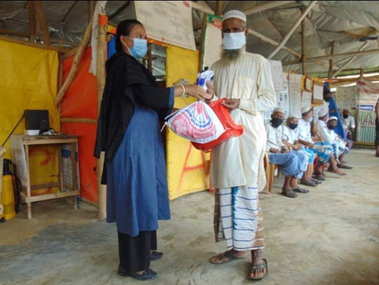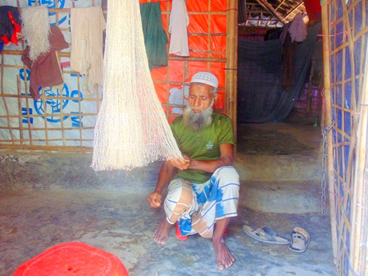In their own words: "Being aged is my advantage"

Hamidur, 64, arrived in Bangladesh in October 2017 with his wife and three children after being forced to flee violence against Rohingya people in Rakhine state, Myanmar. Over 10,000 Rohingya fled from his village alone. Life in the world’s biggest refugee camp, Cox’s Bazar, hasn’t been easy, but the Age-Friendly Spaces run by our partner HelpAge International has helped him to get back on his feet.
When Hamidur and his family first arrived at the refugee camp, they slept in an open field and survived on water alone. The language barrier meant that he could not communicate his needs to the humanitarian workers on the site, even though he was suffering from severe pain, including joint pain in his foot which made walking a struggle. The camp facilities were not set up with the needs of older and disabled people like Hamidur in mind.
Eventually, like many others in the camps, Hamidur and his family made a makeshift home from tarpaulin. But living in these cramped conditions amongst the heat, humidity and dust is tough for older people and many suffer from respiratory infections. Combined with malnutrition from the lack of food, Hamidur was often sick.
Fortunately, our Age-Friendly Spaces were set up for older people like Hamidur to get the support they needed in the camps. Hamidur was able to see a doctor and was prescribed physiotherapy at the Age-Friendly Spaces. He was also able to get medication and guidance on nutrition and healthy living, and has now recovered from the pain and can move freely without support.
Mental health support was also available at the space so that Hamidur could get help to recover from the trauma he'd experienced. And when the pandemic arrived, they made sure that older people like him had the essentials and information they needed to stay safe.
“Before the pandemic, I attended awareness sessions on healthy behaviours and other social issues and when COVID-19 meant our movements were reduced, we followed the precautions advised and received hygiene kits of masks, soap and washing power distributed by the project”.
As well as being a safe space for older people to gather and receive medical support and health advice, the Age-Friendly Spaces provide outreach to older and disabled people in the camps and advocate for their needs.
“Earlier I had to stand in a long queue to get water and to use the toilet, and facilities in my surrounding area were not age-friendly. HelpAge International advocated for our needs with other service providers, where previously it was challenging to get older-people friendly services from other providers”.
Like many of the refugees living in the camps, Hamidur receives food rations. However, it was being able to set up a new livelihood that really made a difference to his life, enabling his family to afford a better diet. With support from the project, he has been able to start a small business making and selling nets.

"We receive monthly food rations that include rice, lentils, and oil. Although the rations are nutritious, it’s difficult to eat the same food day after day. About half of the refugee population now receives e-voucher cards to buy meat and fresh produce from outlets, but balanced nutrition remains a challenge. Without funds, it’s difficult to start a small business to meet needs not being addressed by the existing services. But the grant from the Age-Friendly Spaces in August 2020 gave me a new arena for building my dream”.
Hamidur really appreciates that this project recognised the value and skills of older people like him, by giving them the opportunity to set up and run their own businesses and regain some independence.
“Being aged is my advantage, not a threat! It was utterly a timely plan to give livelihood support to older people, considering their existing skill and knowledge.”
Investing in older business people
Learn how we help older people to become self-sufficient by investing money and training in their businesses.
